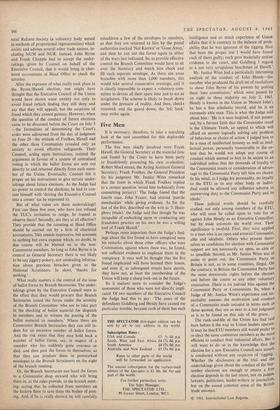Five Men
It is necessary, therefore, to take a searching look at the cast assembled for this deplorable performance.
The five men chiefly involved were Frank Haxell, the General Secretary at the material time and found by the Court to have been party to fraudulently procuring his own re-election; Robert MacLennan, the Acting Assistant General Secretary; Frank Foulkes, the General President (in his judgment Mr. Justice Winn remarked that the form in which Frank Foulkes replied to a certain question 'saved him technically from committing perjury).' The Judge found that the fourth man, John Frazer, had uttered 'puerile mendacities' while giving evidence. As for the last of the five, described on the writ as 'J. Hum- phrey (male),' the Judge said that though 'he was incapable of embarking upon or conducting any fraudulent practice on his own he was a willing tool of Frank Haxell.'
Perhaps more important than the Judge's find- ings about the five found to have conspired were his remarks about those other officers who were Communists, against whom there was, he found, not sufficient evidence to implicate them in the conspiracy. It may well be thought that the five found implicated will have learned their lesson, and even if, as subsequent events have shown, they have not, at least the membership of the Union will keep a sharp look-out in the future.
So it matters more to consider the Judge's assessment of those who were not directly impli- cated. Of two members of the Executive Council the Judge had this to say : The cases of the defendants Goldberg and Hendy have caused me particular trouble, because each of them has such intelligence and so much experience of Union affairs that it is contrary to the balance of prob- ability that he was ignorant of the rigging. Had that been the proper test I would have found each of them guilty; each gave materially untrue evidence to the court, and Goldberg 1 regard as a not very scrupulous henchman of Haxell.'
Mr. Justice Winn had a particularly interesting analysis of the conduct of John Hendy—the member who produced the draft set of resolutions to shear John Byrne of his powers by putting them 'into commission,' which were passed by an eight to three majority on July 2, 1961. Hendy is known in the Union as 'Honest John'; he has a fine scholastic record, and he is an extremely able man. This is what the Judge said about him : 'He is a man inspired, if not posses- sed, by a fervent faith that the Communist creed is the Ultimate Truth, an appeal to which will afford an answer logically solving any problem of behaviour or choice of action. I judged him to be a man of intellectual honesty as well as intel- lectual power, personally honourable to the ex- tent that he would not adopt any course of conduct which seemed to him to be unjust to an individual unless that the demands of loyalty to the Communist tenets or consideration of advan- tage to the Communist Party left him no choice. In his mind, as I judge his personality, no loyalty to the ETU or to any other body or indivi- dual could be allowed any influence adverse to unswerving duty to the Communist Party and its ideals.'
These judicial words should be carefully studied, not only among members of the ETU, who will soon be called upon to vote for or against John Hendy as an Executive Councillor, but by trade unionists the world over. Their significance is twofold. First, they were applied to a man who is an open and avowed Communist, able and idealistic. Others who present them- selves as candidates for election with Communist support are not necessarily so open, so able or so unselfish. Second, as Mr. Justice Winn was at pains to point out, the Communist Party in Britain is not, as in some countries, illegal. On the contrary, in Britain the Communist Party has the same democratic rights before the electors and before the courts as any other voluntary association. There is no judicial bias against the Communist Party or Communists. So, when a Judge of Mr. Justice Winn's experience and im- partiality assesses the motivation and conduct of a Communist trade unionist in terms such as those quoted, they are as near to a last judgment as is to be found on this side of the grave. The rank-and-file of the Union has had laid bare before it the way its Union leaders operate. It may be that ETU members still would prefer to re-elect the same committee members as the most efficient to conduct their industrial affairs. But it will want to do so in the knowledge that the election for a new Executive Council next month is conducted without any suspicion of 'rigging. Whether the disclosures at the trial and the undertakings given about the conduct of the Sep- tember elections are enough to ensure a free election depends in the last resort, not on judges, lawyers, politicians, leader-writers or journalists, but on the sound common sense of the British trade unionist.
g 1961. International Law Reports.


































 Previous page
Previous page